In this section: Zameer Brey, Boyce Mkhize, Sarah Laurence, Luyanda Ngcobo and more…
Zameer Brey; doctor, process analyst, Groote Schuur Hospital

Zameer Brey doesn’t waste time. After qualifying as a medical doctor, he plunged into an MBA with the single-minded purpose of improving healthcare.
His master’s thesis evaluated public-private partnerships in local healthcare and won him an international award as the Young Researcher in Africa to boot. He took the award a second time for his PhD research in healthcare operations management. A staunch unionist, Brey joined the Junior Doctors Association of South Africa as a provincial representative four years ago; he is now the group’s vice-chairperson.
His day job is as a process analyst for Groote Schuur Hospital, where he tries to come up with innovative ways to improve hospital efficiency. In one project he cut patient waiting time at the pharmacy from four hours to 55 minutes, using no additional resources or funds. The new target? Reduce the waiting period to a mere 20 minutes. — Faranaaz Parker
Lunch spot: Blowfish, Bloubergstrand
Dominique Pepper; medical doctor; Infectious Diseases Unit; GF Jooster Hospital
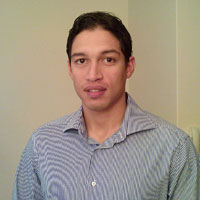
Infectious diseases —- and understanding how complex systems interact -— is why Dominique Pepper chose medicine. It’s also what landed this 28-year-old with first-class honours from the University of Cape Town at the Infectious Diseases Unit at GF Jooste Hospital in Maneberg.
He wants to understand why patients infected with HIV and TB in Khayelitsha are not responding to treatment. He also wants to find out how their lives can be improved by strengthening the broader social systems that directly affect them.
Nothing works in isolation, Pepper says. It’s all interrealated.
Even after eight years of studying, Pepper seems nowhere near done yet. The 10-year plan includes completing an MBA, a master’s in public health and a PhD. — Hendri Pelser
Lunch spot: Primi Piatti, Canal Walk; Nova, Cape Town
Mdu Mntambo; senior project coordinator; Wits Reproductive Health and HIV Research Unit; Chris Hani Baragwanath
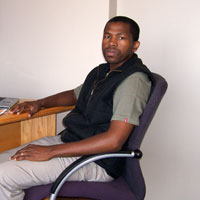
Mdu Mntambo knew that his future lay in biology and medicine. But after completing his BSc, he started working as a medical microbiologist in a commercial laboratory. Mntambo soon realised that he wanted to be involved in the prevention of sexually transmitted infections (STIs), especially HIV.
As a senior project coordinator at Wits’ Reproductive Health and HIV Research Unit at Chris Hani Baragwanath Hospital in Soweto, he now spends his days studying STI prevention methods.
It’s an intellectually stimulating job, but he admits that it is difficult to see healthy people participating in his trials who, all too often, become infected with HIV. Disheartening as that is, it hasn’t slowed him down. Mntambo recently applied for a research grant towards a PhD within a fortnight of completing his master’s dissertation. — Hendri Pelser
Lunch spot: Capellos, Newtown, Johannesburg
Francois Venter; clinical director; University of Witwatersand’s Reproductive Health and HIV Research Unit
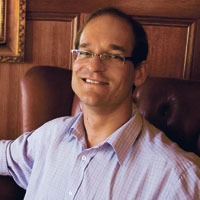
Dr Francois Venter is afraid of the future. The head of the Wits’ Reproductive Health and HIV Research Unit fears that the HIV prevention battle is being lost.
One recent study shows about 1 000 South Africans die of Aids every day and there is a crisis of treatment because only 40% of South Africans who need antiretrovirals are able to get treatment. That’s why Venter spends his days trying to find ways to fight, monitor and contain the virus.
He was involved in the national and provincial department of health’s 2003 antiretrovial roll-out working groups to develop guidelines on opportunistic illnesses and antiretroviral treatment. — Hendri Pelser
Lunch spot: Doppio Zero, Greenside
Vikash Sewram, director, Medical Research Council
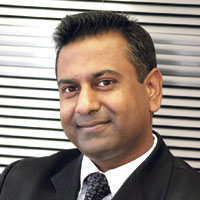
Vikash Sewram wants to find a cure for cancer. And though he understands quite clearly that this might never happen, that won’t deter him. You just need to dream big, he says. The thing is, he might just do it.
Sewram has done more than most people accomplish in several lifetimes. He has two doctoral and two master’s degrees under his belt. When he was 29, he developed a non-invasive way to detect cancerous agents using people’s hair. Now, he’s the youngest director at the Medical Research Council, heading up the MRC’s Oncology Research Unit.
Science, to the Hindu spiritualist and philosopher, is about delving in the unknown, he says. It’s about truth, changing the way people think and improving people’s lives. Lucky for all of us, that’s right smack in the realm where Sewram dwells. — Hendri Pelser
Lunch spot: Jewel of India, Durban
Luyanda Ngcobo, HIV/Aids activist
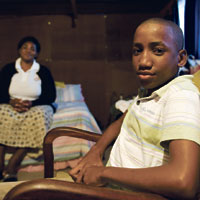
Remember Nkosi Johnson? Actually, how can we ever forget?
Nine years after his poignant speech at the International Aids Conference in 2000 and his death the following year, he remains a powerful inspiration to South Africans living with the pandemic. Being the brave face of HIV/Aids in a country where stigmas abound and government policy is still inadequate was no easy task, but Nkosi personified hope and courage instead of a death sentence.
At this year’s South Africa’s Aids Conference, 16-year-old Luyanda Ngcobo displayed that same steely bravery while delivering the Nkosi Johnson Memorial Lecture.
Like Nkosi, Luyanda was born HIV positive but is determined to not let the virus get in the way of his dreams.
“HIV can never be an excuse for not becoming what you want to become in life,” he said, receiving a standing ovation from the audience and Archbishop Desmond Tutu.
Ngcobo has been frequenting hospitals since the age of five. He still remembers the taste of TB medication, which he took for six months during 1997 after getting infected with the bacterium.
He started school in 1999 but a constant fever and diarrhoea kept him at home most days. He had to drop out around June and fell terribly ill in December.
Despite spending a huge part of his childhood in hospital beds and on medication, Ngcobo enjoys his life to the full. He resumed school in 2001, and excels in his subjects, especially English. “I always want to be a leader, not a follower,” he says.
He finds time every day for homework, video games, quality time with his mother and, most importantly, his antiretroviral medication.
Ngcobo knows that he will have to continue taking them every day for the rest of his life.
“That’s my only challenge,” he says confidently. — Qudsiya Karrim
Lunch spot: Spur Steak Ranch, Waterfront, Cape Town
Safiya Vachiat; medical officer; Chris Baragwanath Hospital
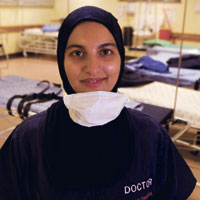
Working in a public hospital is a gruelling job, but Safiya Vachiat loves it. She’s surrounded by her passion — kids — every day at Chris Hani Baragwanath Hospital, where she works as a medical officer in the paediatric surgery department.
The hours are exhausting, the pay is bad and the hospital has its fair share of horror stories, but Vachiat can’t imagine doing anything else.
She admits to sleeping more nights at the hospital than in her own bedroom, which made her a deserving winner of the Intern of the Year award at Bara in 2007. — Qudsiya Karrim
Lunch spot: 2Go, Fordsburg, Johannesburg
Patience Mavata; co-founder and manager; Ikhaya Lobomi
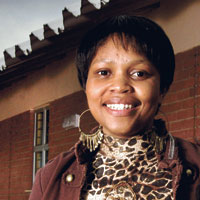
Patience Mavata is an experienced nurse, HIV/Aids counsellor and caregiver.
In 2000, spurred by her love for medicine and her sister’s struggle with HIV, Mavata and her husband founded Ikhaya Lobomi, a community support centre offering holistic care to the sick. The centre provides nutritional, volunteer, and educational services for the community. Since 2001, HIV/Aids related deaths of her patients have decreased from 90% to 10% a year.
In 2003, she initiated the development of Inochi, a herbal supplement for the treatment of HIV/Aids. Case studies have shown the supplement to be successful in increasing patients’ CD4 count and decreasing their H1 viral load.
Mavata is also an avid researcher, and has presented to the Harvard Institute of South Africa and the National Nursing Association of Southern Africa. She received the Unilever 100 Women Award in 2003 and the SAFM Women Otherwise Award in 2004. — Qudsiya Karrim
Lunch spot: Ile Maurice, Umhlanga, KwaZulu-Natal
Boyce Mkhize; chief executive; Health Professions Council of South Africa
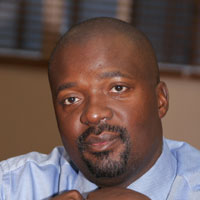
In the last few months the health profession has had to deal with some controversy: Schabir Shaik being released from prison on the grounds of ill health and the doctor’s strike to name but a few, but Advocate Boyce Mkhize sees his job as keeping his organisation on track as a credible regulator.
Mkhize started his career at the Community Law Centre in Durban as a human rights lawyer and was later appointed by the Constitutional assembly to manage the drafting of the constitution for KwaZulu-Natal.
He joined the Health Professions Council of South Africa as chief executive and registrar in 2000. He is also the author of two books — and the Two Shall become One: 10 Marriage Commandments and Life Principles and South African Constitutional Values. — Eamon Allan
Lunch spot: Cynthia’s Indigo Moon, Brooklyn, Pretoria
Sarah Laurence; research analyst; Health and Development Africa
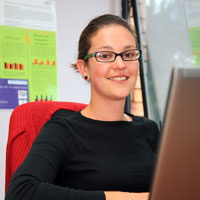
Sarah Laurence spends much of her time on the road. She travels to and from communites as a research analyst for Health and Development Africa, providing technical assistance to NGOs and governmental departments on HIV prevention. She’s a project manager for the John Hopkins Health and Education in South Africa.
Laurence is a trained physiotherapist and has worked at both public and private hospitals. Recently she completed a postgraduate diploma in management at Wits Business School.
She is studying for a master’s in public health and sees a PhD somewhere in her future. — Hendri Pelser
Lunch spot: Espresso, Parktown, Johannesburg